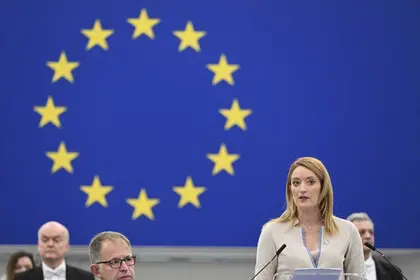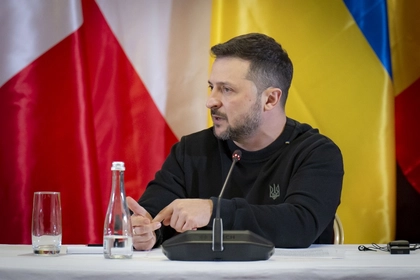The European Parliament (EP) called for support for the investigation of war crimes and crimes against humanity committed by Russia, with the subsequent prosecution of those involved and for the creation of a special tribunal for the crimes of Russian aggression against Ukraine.
The corresponding resolution was voted on Wednesday. Nov. 23, in Strasbourg within the framework of the EP plenary session.
“[EP] calls for renewed support for the ongoing independent investigations of war crimes and crimes against humanity committed by Russia, which should ensure that those involved in planning, organising, committing or facilitating these crimes are individually held to account; calls on the EU and its Member States to provide the appropriate support for the establishment of a special tribunal dealing with the crime of aggression by Russia against Ukraine,” according to the resolution.
In addition, the European Parliament called on Member States to include the crime of aggression in their national legislation and that the EU “to ensure the inclusion of a gender perspective in these investigations, including the prosecution of crimes of sexual violence against women, which can also constitute war crimes and crimes against humanity.”
The European Parliament also noted the need for the Commission and Member States to work together with the Ukrainian authorities to create a comprehensive international compensation mechanism, including an international register of damages. The EP considered it important that the Commission and the parties involved complete work on the development of a legal regime that will allow the confiscation of Russian assets frozen by the EU and use them to eliminate the consequences of Russian aggression against Ukraine, including the restoration of Ukraine and compensation for victims of Russian aggression.

Ukraine: Putin Confirms Attack with New Missile
The EP also welcomed the Commission’s November 9 proposal for an EUR 18 billion support package for Ukraine in 2023 to ensure its macroeconomic stability, restore critical infrastructure and maintain basic public services, and reaffirmed support for the early adoption of this proposal.
In addition, the EP condemned the Russian occupation of Zaporizhia power plant in order to “intimidate the Ukrainian population and condemned Russia for turning power plants into a military target.”
The resolution also contains a paragraph calling on the Russian people not only to refuse to be drawn into this war, but also to protest against the atrocious war crimes against the people of Ukraine committed by the Russian Federation on behalf of the Russian people.
In the resolution, the European Parliament stated that after the Russian Federation launched an illegal, unprovoked and unjustified aggressive war against Ukraine on February 24 this year, its troops carried out “indiscriminate attacks on residential areas and civilian infrastructure, killed thousands of Ukrainian civilians and committed terrorist acts throughout the country, destroying civilian infrastructure – residential areas, schools, hospitals, train stations, theaters, water and electricity networks.
“These brutal and inhumane acts are causing death, suffering, destruction and displacement,” the European Parliament said.
The document notes that “the Russian armed forces and their proxies carried out mass executions, kidnappings, sexual violence, torture and other atrocities in the new and previously occupied territories of Ukraine, including massacres of civilians in cities such as Bucha, Irpen, Izium and Lyman, a deliberate attack on a theater in Mariupol that killed hundreds of people, and an attack on the Kramatorsk railway station that killed 60 civilians.”
In addition, it is said that in Ukraine “many thousands of civilians were killed, including hundreds of children, many others were subjected to torture, harassment, sexual harassment, abduction, forced displacement or disappearance by the Russian armed forces and their proxies. “In this regard, it is noted that these ‘numerous atrocities committed by the Russian armed forces and their puppets against civilians in Ukraine’ were ‘thoroughly documented” by human rights organizations and international observer missions. Other crimes also include mass detentions of civilians in so-called filtration centers, forced adoption of Ukrainian children and forced deportation.
“The number of documented war crimes in Ukraine is nearing 40,000 and is expected to increase after war crimes are documented in the recently liberated parts of Kherson oblast,” the European Parliament notes. Also, according to monitoring data collected by the Ukrainian Institute of Mass Information, the Russian Federation has committed 457 crimes against journalists and media in Ukraine, and since the beginning of the aggressive war, Russian invaders have killed more than 40 Ukrainian and foreign journalists.
The EP pointed out that the Russian Federation, with its acts of aggression against the sovereignty, independence and territorial integrity of Ukraine, continues to violate the principles of the UN Charter, and also grossly violates international humanitarian law, including by deliberately striking civilian targets that should not be the object of attack in accordance with Article 52(1) Additional Protocol I of 1977 to the Geneva Conventions of 1949 “These crimes reflect a grotesque indifference to the rules and laws of war which restrict the use of military force, as seen, for example, in the inhuman treatment of prisoners of war, the widespread use of torture and extrajudicial executions of Ukrainian prisoners of war, as well as denial of access to international humanitarian organizations such as the International Committee of the Red Cross.
In addition, the EP said the Russian Federation has already fired more than 4,000 missiles at Ukraine and fired at the country more than 24,000 times, including from the territory of Belarus, and 60,982 objects have been damaged or destroyed by Russian missile, unmanned and artillery strikes to date. civil infrastructure throughout Ukraine, including 42,818 residential buildings and houses, 1,960 educational institutions and 396 medical institutions, 392 cultural and 87 places of worship, 5,315 water supply and power supply facilities. “Intentional attacks by Russian missiles and drones, including those using Iranian-supplied drones, have damaged or destroyed about 40% of Ukraine’s vital energy infrastructure,” the resolution details.
Separately, the document refers to the blockade of Mariupol, during which “the authorities of the Russian Federation created a large-scale humanitarian crisis, which led to the death of tens of thousands of civilians and the destruction of 95% of the city.”
You can also highlight the text and press Ctrl + Enter






